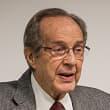Explore the evolving nuclear dangers and learn how to take action for a safer future in this comprehensive Stanford course.
Explore the evolving nuclear dangers and learn how to take action for a safer future in this comprehensive Stanford course.
This vital course examines the ongoing threats posed by nuclear weapons in the 21st century. Led by Dr. William J. Perry and expert educators, the course provides deep insights into nuclear weapons development, proliferation, and current global risks. Students learn about historical nuclear tensions, modern security challenges, and practical steps for preventing nuclear catastrophe. The course uniquely combines academic knowledge with a call to action, empowering participants to contribute to nuclear risk reduction.
5
(6 ratings)
Instructors:
English
English
What you'll learn
Understand the fundamentals of nuclear weapons and their development
Analyze historical nuclear proliferation patterns globally
Evaluate Cold War nuclear tensions and their modern implications
Assess current nuclear terrorism risks and prevention strategies
Examine nuclear policy dilemmas and potential solutions
Identify concrete actions for reducing nuclear dangers
Skills you'll gain
This course includes:
PreRecorded video
Graded assignments, Exams
Access on Mobile, Tablet, Desktop
Limited Access access
Shareable certificate
Closed caption
Get a Completion Certificate
Share your certificate with prospective employers and your professional network on LinkedIn.
Created by
Provided by

Top companies offer this course to their employees
Top companies provide this course to enhance their employees' skills, ensuring they excel in handling complex projects and drive organizational success.





There are 10 modules in this course
This course explores the critical challenges posed by nuclear weapons in our contemporary world. Led by experienced practitioners and scholars, it covers the historical development of nuclear weapons, their proliferation, and current global threats. The curriculum emphasizes understanding both historical contexts and present-day nuclear risks, while providing practical knowledge about prevention strategies and policy solutions. Special attention is given to emerging nuclear dangers and opportunities for risk reduction.
Introduction: What Are Nuclear Weapons and Why Were They Developed?
Module 1 · 4 Hours to complete
Nuclear Proliferation in the United States and Around the World
Module 2 · 4 Hours to complete
Under a Nuclear Cloud: Early Cold War
Module 3 · 4 Hours to complete
Fear and Loathing and Relief: Later Cold War
Module 4 · 4 Hours to complete
A Lack of Intelligence
Module 5 · 4 Hours to complete
Dilemmas of Nuclear Policy
Module 6 · 4 Hours to complete
New Nuclear Dangers: Nuclear Terrorism
Module 7 · 4 Hours to complete
New Nuclear Dangers: South Asia and Proliferation
Module 8 · 4 Hours to complete
What Has Been Done, and Can Be Done, about Nuclear Dangers
Module 9 · 4 Hours to complete
What Next?
Module 10 · 4 Hours to complete
Fee Structure
Instructor

2 Courses
America's Nuclear Security Champion and Defense Visionary
William J. Perry, the 19th U.S. Secretary of Defense and current Michael and Barbara Berberian Professor Emeritus at Stanford University, has shaped American defense and nuclear security policy for over five decades. After completing his education with degrees from Stanford and Pennsylvania State University, Perry emerged as a pioneering figure in Silicon Valley, founding ESL Inc. in 1964 to develop crucial digital technologies and satellite reconnaissance systems. His government service includes roles as Deputy Secretary of Defense (1993-1994), Secretary of Defense (1994-1997), and Under Secretary of Defense for Research and Engineering (1977-1981), during which he orchestrated the dismantling of over 8,000 nuclear weapons and fostered cooperative relations with Russia. At Stanford, Perry holds joint appointments at the Freeman Spogli Institute for International Studies and the School of Engineering, while serving as a senior fellow at the Hoover Institution. In 2013, he established the William J. Perry Project to educate the public about nuclear dangers, developing influential courses including "Living at the Nuclear Brink" and "The Threat of Nuclear Terrorism." His exceptional contributions have earned him numerous accolades, including the Presidential Medal of Freedom and Knight Commander of the British Empire, while his ongoing work continues to influence global nuclear security policy and international relations. As a member of the National Academy of Engineering and a respected voice in preventive defense strategies, Perry remains actively engaged in addressing contemporary nuclear security challenges through education, research, and public advocacy.
Testimonials
Testimonials and success stories are a testament to the quality of this program and its impact on your career and learning journey. Be the first to help others make an informed decision by sharing your review of the course.
Frequently asked questions
Below are some of the most commonly asked questions about this course. We aim to provide clear and concise answers to help you better understand the course content, structure, and any other relevant information. If you have any additional questions or if your question is not listed here, please don't hesitate to reach out to our support team for further assistance.


